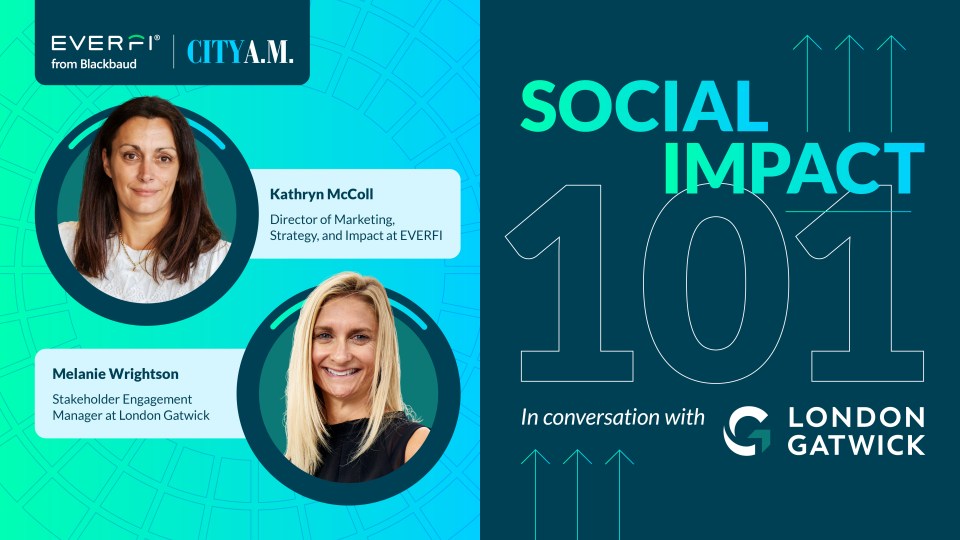
Social impact 101 with London Gatwick: Investing in the local community

It’s 2024 and this is the year of Social Impact.
Welcome to the Social Impact 101 series by EVERFI from Blackbaud, where businesses and their leaders across the UK – and overseas – talk about how their social impact programmes are supporting overall business objectives and making a positive difference to the lives of young people all over the UK, and beyond…
Each edition of Social Impact 101 sees EVERFI from Blackbaud’s Director of Marketing, Strategy & Impact, Kathryn McColl interview leaders of the businesses at the forefront of this change by creating social impact through the power of education, in a quick-fire five-question interview.
In the first edition of Social Impact 101, we hear from Melanie Wrightson, Stakeholder Engagement Manager for London Gatwick, to better understand the business decisions behind their “Decade of Change’ strategy, how educating the next generation of young people locally is important to them and how they are doing it.
Kathryn: Can you tell us why Gatwick decided to create social impact through education?
Melanie: London Gatwick is committed to building a sustainable future for the airport and its local communities. We have a proud record of providing local young people with support and opportunities at the airport, which forms part of our sustainability plan, “Decade of Change”, which sets out ten sustainability goals to achieve by 2030. Crucially, our approach to a sustainable London Gatwick includes investing in our local communities. We want to engage and inspire the next generation to build their skills and be able to access the amazing opportunities here, especially with so many local people employed at the airport, including in key STEM roles. In fact, we have committed to 1 million student encounters by 2030 through our education programmes.
Kathryn: What has been London Gatwick’s main focus of your partnership with EVERFI from Blackbaud?
Melanie: Skills in science, technology, engineering and maths (STEM) are critical to aviation and are recognised as a priority for education nationally. London Gatwick has a long track record in prioritising STEM in education programmes and outreach to local schools. Our key partnership with you [EVERFI from Blackbaud] helps to create learning opportunities to inspire the next generation of scientists, engineers, technologists, and mathematicians. Your partnership has allowed us to offer STEM learning to over 800 young people in our local area. At no cost to schools, the digital education programme, Endeavour, has enabled students to practise and develop core STEM skills, all whilst exploring and understanding real-world careers.
Kathryn: Can you explain the benefits of supporting education initiatives for London Gatwick?
Melanie: Education is a vehicle for change and directly impacts our next generation of young people. Recognising the importance of STEM subjects, London Gatwick provides an extensive package of career-related support, steered by colleagues from across the business including engineering, IT, cyber security, innovation and construction. Throughout the past year, Gatwick’s STEM education delivery team have led on virtual events, airport visits and in-school talks, workshops, and practical labs. More than 70,000 school children across Sussex, Surrey and Kent have benefitted from London Gatwick’s education programmes over the past year, with the airport supporting pathways into the workplace.
Kathryn: How does Social Impact help you meet your wider business ESG goals?
Melanie: As we enter our second ‘Decade of Change’ our commitment to a sustainable London Gatwick is stronger than ever. We are building on progress made in previous years and accelerating action through ten goals focused in areas that matter the most to our business: people and communities, net zero and the local environment. They are at the heart of everything we set out to achieve and align with the United Nations Sustainable Development Goals. Sustainability involves an integrated approach to economic, societal and environmental issues and solutions, in which a healthy economy, sensible use of financial resources, human and technological innovation, teamwork and partnerships are all key. Sustaining good jobs and strong employment benefits society, the environment, and the economy. Our plan recognises this vital connectivity.
Kathryn: Finally, how important is it to create opportunities for young people to understand STEM careers?
Melanie: STEM is at the heart of London Gatwick’s education strategy and plays a vital role in shaping the direction of the airport’s work in developing opportunities for the region. STEM is crucial to Gatwick with hundreds of career opportunities available at the airport itself and with the many partners who work together to keep the airport running. A diverse and skilled pipeline of local talent is key to a healthy labour market and to London Gatwick’s future growth. In fact, London Gatwick recently opened a brand-new STEM Centre to inspire local children and students to pursue airport-related careers.
According to the Youth Voice Census report in 2023, 42% of young people in the UK are not confident that there are quality jobs available in their local area. As outlined by Melanie Wrightson, London Gatwick are keen advocates for equipping young people with skills that enable them to visualise a career working at London Gatwick and showing them how STEM skills are a key part in their long-term success.
EVERFI from Blackbaud has been providing London Gatwick with Endeavour, a digital education programme that gives students aged 11-16 an opportunity to explore a variety of STEM careers available to them for just over a year and in that time have reached more than 800 young people. The partnership has been supported by three in-school workshops, whereby EVERFI facilitators use creative and fun ways to engage young people and get them access to the platform provided by London Gatwick.
Find out more about how you can create social impact using the power of education here.